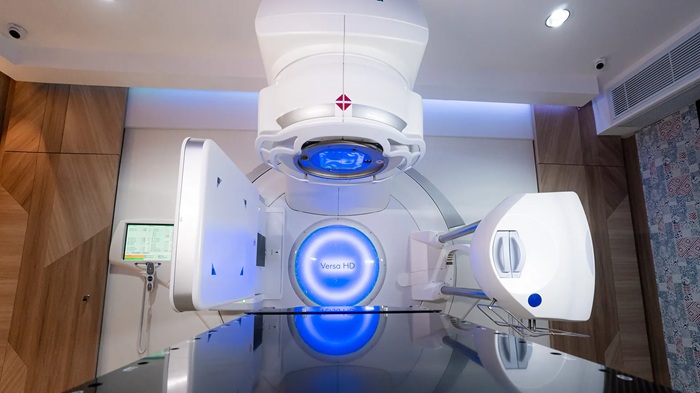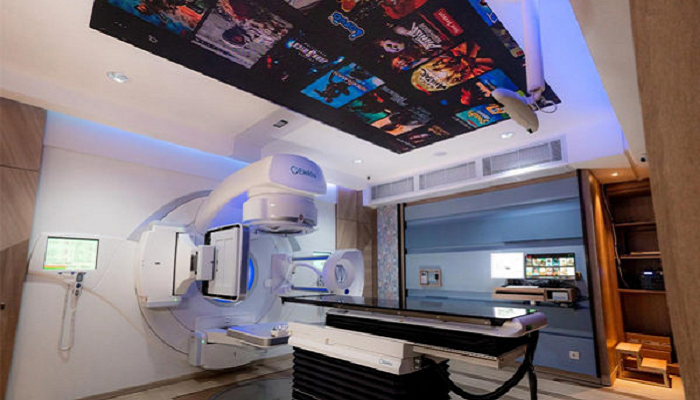Radiation therapy, also known as radiotherapy, is a cancer treatment method that uses high doses of radiation to destroy cancer cells and reduce tumor size.
At high doses, radiation works by damaging the DNA of cancer cells, which prevents them from growing or causes them to die. When the DNA of cancer cells is damaged beyond repair, the cells stop dividing or eventually die. These dead cells are then broken down and naturally eliminated by the body.
The radiotherapy process does not kill cancer cells immediately. It usually takes several days to weeks of treatment before the DNA of cancer cells is damaged enough to cause cell death. Even after treatment ends, cancer cells continue to die gradually over the following weeks to months.
Contents
How Radiotherapy Works and Its Types
There are two main types of radiotherapy: external radiation and internal radiation.
1. External Beam Radiation Therapy
External beam radiation uses a large machine that directs radiation to the cancer area in the body. This machine does not touch the patient but can move around the body to aim radiation at the tumor from different angles.
External beam radiation is a local treatment, meaning it only targets a specific area of the body. For example, if the cancer is in the lungs, radiation is only directed at the chest area, not the entire body.
2. Internal Radiation Therapy
Internal radiation involves placing a radiation source inside the body. The radiation source can be either solid or liquid.
Internal Radiation with Solid Sources (Brachytherapy)
In brachytherapy, radiation sources in the form of small seeds, ribbons, or capsules are placed inside or near the tumor. Like external radiation, brachytherapy is also a local treatment that only targets specific areas. While the source remains in the body, radiation is emitted for a certain period.
Internal Radiation with Liquid Sources (Systemic Radiation Therapy)
This type of radiotherapy is systemic, meaning the radiation spreads through the bloodstream to reach tissues throughout the body and destroy cancer cells. It is administered orally or intravenously.
Systemic radiation therapy has two main approaches:
- Targeted radionuclide therapy: uses radioisotopes attached to specific molecules that directly target cancer cells.
- Radioimmunotherapy: uses radioactive substances combined with monoclonal antibodies. Once injected, the antibodies deliver radiation directly to cancer cells for more precise treatment.
During systemic radiation, body fluids such as urine, sweat, and saliva will temporarily emit radiation.
The type of radiation therapy given to a patient may vary depending on several factors, such as the type of cancer, tumor size, and tumor location in the body. The proximity of the tumor to normal tissues that are sensitive to radiation is also a key consideration.
Other factors include the patient’s overall health condition, medical history, plans for other cancer treatments, age, and the presence of other underlying diseases.
When Do Doctors Recommend Radiotherapy?
Radiotherapy is used to treat almost all types of cancer. In fact, more than half of cancer patients undergo radiation therapy as part of their treatment.
Radiation therapy can be given at different stages or for different purposes during cancer treatment. Doctors may recommend radiotherapy in the following situations:
- As the sole cancer treatment, known as primary therapy.
- Before surgery, to shrink the cancer. This stage is called neoadjuvant therapy.
- After surgery, to stop the growth of any remaining cancer cells. This is known as adjuvant therapy.
- In combination with other treatments, such as chemotherapy, to destroy cancer cells more effectively.
- To relieve symptoms of advanced-stage cancer, helping improve the patient’s quality of life.
What Are the Side Effects of Radiotherapy?
Most patients undergo radiotherapy in multiple sessions, rather than receiving one large dose at once. This allows healthy tissues time to recover between treatments, reducing the risk of side effects.
However, some patients may still experience unpleasant side effects. Doctors will help manage and minimize these effects. In general, side effects only occur in the part of the body that receives radiation directly.
Possible radiotherapy side effects include:
- Fatigue
- Nausea
- Vomiting
- Diarrhea
- Headaches
- Skin irritation
- Dry and itchy scalp
- Hair loss
- Mouth sores
- Painful swallowing
- Loss of appetite
- Burning sensation in the throat or chest
- Pain or burning when urinating
- Frequent urination in small amounts
- Bloating or abdominal cramps
- Urgent need to have a bowel movement
Radiotherapy at Mandaya Royal Puri Hospital with Advanced 4D Linac Elekta Versa HD


At Mandaya Royal Puri Hospital, radiotherapy is performed using the Linac Elekta Versa HD, one of the most advanced technologies in cancer radiation treatment.
This device is designed to deliver radiation with extremely high precision while ensuring patient comfort during therapy.
1. Submillimeter precision
Radiation is delivered directly to the tumor with accuracy up to 1 mm, effectively destroying cancer cells while sparing healthy tissues.
2. SRS & SBRT technology
With Stereotactic Radiosurgery (SRS) and Stereotactic Body Radiotherapy (SBRT), Elekta Versa HD works like a “radiation knife,” delivering high, focused doses. This allows for fewer therapy sessions while maintaining effectiveness.
3. Ability to target multiple tumors at once
In a single session, the device can deliver radiation to several tumors simultaneously, covering areas up to 40 cm x 40 cm. This makes treatment more efficient and practical for patients.
4. 4D IGRT (image-guided radiotherapy) technology
The 4D imaging system ensures radiation stays on target even if the tumor moves while the patient breathes, maintaining accuracy throughout the procedure.
5. Minimized risk to healthy tissues
By focusing radiation only on the cancer area, damage to surrounding healthy tissue is reduced, lowering the risk of complications.
6. Shorter treatment duration
Since radiation is delivered in high, precise doses, the number of therapy sessions can be reduced, making treatment faster compared to conventional radiotherapy.
7. Greater patient comfort
Supported by robotic technology and the ability to adapt radiation to the tumor’s shape and location, patients experience more comfortable sessions with minimal pain and better results.
Expert Radiotherapy Specialists at Mandaya Royal Puri Hospital
Mandaya Royal Puri Hospital is supported by an experienced team of radiation oncologists, including:
1. Prof. Dr. dr. Soehartati A. Gondhowiardjo, Sp.Onk.Rad (K)

Prof. Dr. dr. Soehartati A. Gondhowiardjo, Sp.Onk.Rad (K), is a radiation oncology expert with extensive academic and clinical experience. She earned her medical degree from Universitas Indonesia in 1980 and completed her specialization in Radiology in 1987 at the same university. In 1989, she pursued a subspecialty in Radiation Oncology at Universitas Indonesia and Strahlentherapie Abteilung Wilhelm-Westfälischen Universität Münster in Germany. In 1998, she obtained her Doctorate in Medical Sciences from Universitas Indonesia in collaboration with AKH Vienna.
Beyond her formal education, Prof. Soehartati has consistently enriched her expertise through international training and workshops, including the Indonesia-IAEA Comprehensive Collaboration for the Development of Radiation Medicine Facilities in Indonesia Workshop (2023), LPDP Scholarship Interviewer Coaching (2023), and the ESTRO: Evidence-Based Radiation Oncology Course (2023). Her international experience, research, and dedication play a key role in advancing radiation oncology services in Indonesia.
Schedule at Mandaya Royal Puri Hospital:
-
Wednesday: 13:30 – 17:00 WIB
2. dr. Novina Fortunata, Sp.Onk.Rad

dr. Novina Fortunata, Sp.Onk.Rad, is a radiation oncology specialist who graduated from Universitas Airlangga and later completed her specialization in Radiation Oncology at Universitas Indonesia.
She actively participates in scientific forums, seminars, and training both nationally and internationally. These include the 3rd Jakarta Annual Collaborative Cancer Meeting (JACCM) 2022, the FARO Webinar series (Federation of Asian Organizations for Radiation Oncology), and several Continuing Medical Education (CME) programs by the Indonesian Radiation Oncology Society (IROS). Her active involvement ensures she stays updated with the latest advancements in radiotherapy technology and clinical applications for various types of cancer.
Schedule at Mandaya Royal Puri Hospital:
- Monday: 08:00 – 16:00 WIB
- Tuesday: 08:00 – 16:00 WIB
- Wednesday: 08:00 – 16:00 WIB
- Thursday: 08:00 – 16:00 WIB
- Friday: 08:00 – 16:00 WIB
- Saturday: 08:00 – 13:00 WIB
3. dr. Riyan Apriantoni, Sp.Onk.Rad

dr. Riyan Apriantoni, Sp.Onk.Rad, is a radiation oncology specialist who graduated from Universitas Sriwijaya and completed his specialization in Radiation Oncology at Universitas Indonesia.
His expertise covers not only conventional radiotherapy but also advanced technologies such as Stereotactic Radiosurgery (SRS) and Stereotactic Body Radiation Therapy (SBRT), which deliver radiation with extremely high precision. He is also skilled in brachytherapy and other radiotherapy techniques, tailoring treatments to meet patients’ needs for optimal outcomes.
Schedule at Mandaya Royal Puri Hospital:
- Monday: 17:00 – 19:30 WIB
- Tuesday: 17:00 – 19:30 WIB
- Wednesday: 17:00 – 19:30 WIB
- Thursday: 17:00 – 19:30 WIB
- Friday: 17:00 – 19:30 WIB
Easy Access to Radiotherapy Services at Mandaya Royal Puri Hospital
For your convenience, you can use the Chat via WhatsApp, Book Appointment, or the Care Dokter app (available on Google Play and App Store) to schedule visits, check queue numbers, and access complete information about hospital services.


